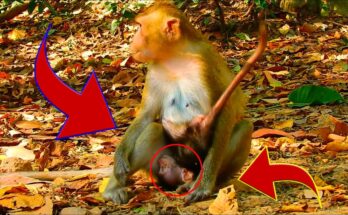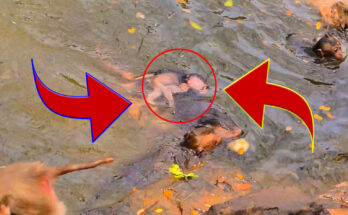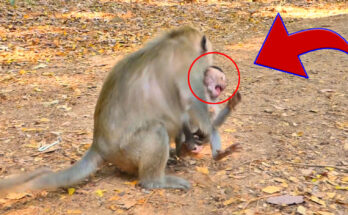Nature can often be as perplexing as it is beautiful, with countless instances where animal behavior defies human understanding. One of the most unsettling scenarios is witnessing a mother animal acting in ways that seem inexplicable or even cruel. A particularly haunting example can be seen in the behavior of primates, such as monkeys, whose maternal instincts are typically thought to be strong and protective. Yet, there are cases where a mother monkey’s actions toward her baby leave observers asking, “Why did the mother do that?”
One such instance recently captured in the wild raised eyebrows and sparked a wave of concern and confusion. A baby monkey, seemingly healthy and thriving in its early days, suddenly faced a tragic turn of events. The mother, once tender and nurturing, began to exhibit aggressive and disinterested behavior toward her own child. At first, onlookers thought they had misunderstood the situation, but soon it became clear that something was seriously wrong.
Primates, particularly monkeys, are known for their tight-knit family structures. Mothers usually invest a tremendous amount of energy and care into the upbringing of their young. Yet, the sight of a mother neglecting or even harming her baby seems incomprehensible, especially to those who view it through the lens of human morality. But such behavior, while heartbreaking, is not as uncommon as it seems. To fully understand why a mother monkey might behave this way, it’s essential to consider several key factors rooted in biology, environmental stressors, and even evolutionary pressures.
One possible reason for a mother monkey abandoning or harming her baby is a lack of resources. In the harsh environment where many monkeys live, food can be scarce. The survival of the fittest principle plays a significant role in shaping behavior. If a mother perceives that her baby is weak, sick, or unlikely to survive, she may make the painful decision to abandon or harm the infant. This is an instinctual response designed to preserve her own energy for future reproductive opportunities. In the wild, ensuring the survival of the mother often takes precedence over the survival of a single offspring, especially if it’s unlikely to contribute to the gene pool.
Another factor is the presence of stress. Primates, much like humans, experience stress due to environmental changes, predation threats, or social disruptions. A mother in distress may find it difficult to care for her young, either because she is too preoccupied with her own survival or because she is suffering from malnutrition or illness. When the mother is under extreme stress, she might react unpredictably. This can manifest as neglect or aggression toward her baby, behaviors that are driven by an inability to cope with the overwhelming pressures of her situation.
In some rare and extreme cases, a mother monkey might even kill her baby if the infant is displaying signs of severe deformities or if the baby’s condition suggests it would be too weak to survive in the long run. This might seem horrific, but in nature, the concept of “mercy killing” is driven by evolutionary survival instincts. In these situations, the mother’s actions are rooted in an unconscious desire to save herself and other potential offspring from a future burden.
Furthermore, social dynamics within monkey groups can play a role in a mother’s behavior. If the group is in turmoil—such as during a time of infighting or leadership struggles—the mother may become distracted or unable to properly care for her young. In some species, a mother’s ability to protect her baby is dependent on her standing within the social hierarchy. If she feels weak or vulnerable, she might not have the strength or confidence to care for her baby as effectively as usual.
It’s also important to consider that there are instances of maternal rejection due to the infant’s behavior. In some cases, if a baby monkey fails to bond with its mother correctly—perhaps due to an injury, illness, or a failure to latch onto the mother’s body—the mother might refuse to care for it. This could be an instinctual response to avoid wasting valuable resources on an infant who might not be able to thrive.
In conclusion, while a mother monkey’s actions toward her baby may appear to be incomprehensible or cruel, they are often driven by complex biological, environmental, and social factors. Understanding animal behavior requires stepping away from human moral frameworks and acknowledging that in the animal kingdom, survival often trumps emotional attachment. The brutal reality of life in the wild means that sometimes, the decisions a mother makes—while harsh—are ultimately about preserving her own life and ensuring the continuation of her species. As much as it pains us to witness, the behaviors of animals are shaped by survival instincts that are far removed from human emotions and notions of right and wrong.


